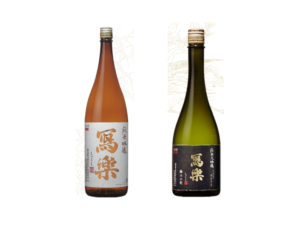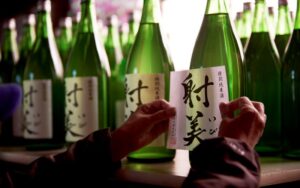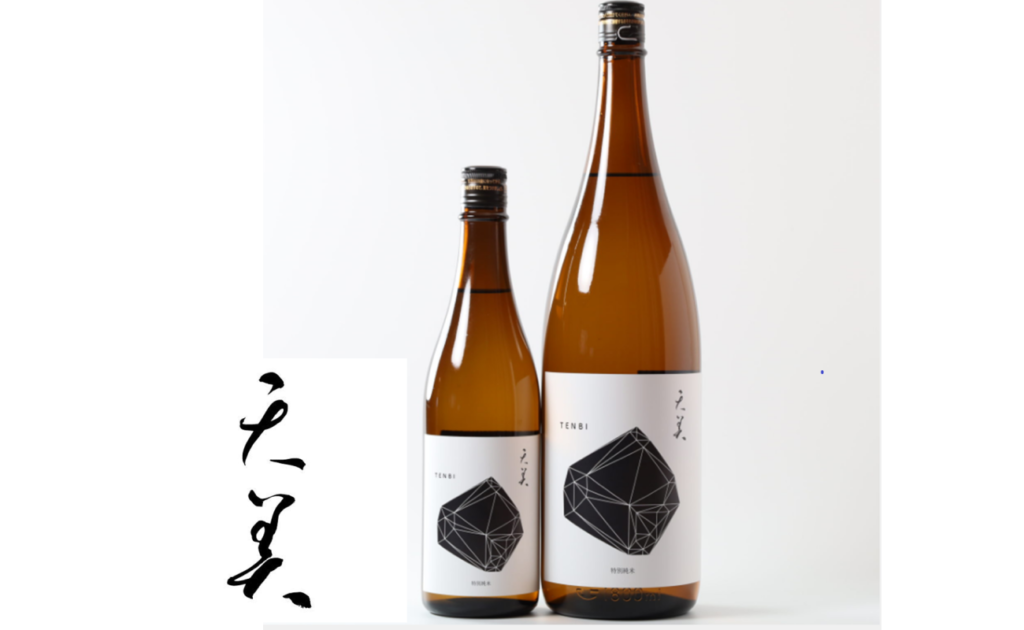
TENBI is brewed in Shimonoseki-city, Yamaguchi prefecture.
Contents
Where the name TENBI came from
In the first place, sake was offered to the gods to pray for a good harvest. It was also a way of expressing gratitude for the crop (rice) harvested under the energy of the sun, and for the sake made from that rice. The name TENBI is derived from the "Ten(天)" of Amaterasu(天照)*1, an ancient Japanese deity, and the "Bi(美)" of Biroku(美禄), meaning good sake, in reference to the sun that nurtures rice.
Why, then, did the Choshu Sake Brewery, which brews TENBI, insist on using the sun for their sake brand name? It all starts with the history and transition of the Choshu Sake Brewery.
The origin of Choshu Sake Brewery was founded in 1871 as Kodama Sake Brewery and has been in the sake brewing business for nearly 150 years. As times changed and management became difficult, they had an encounter with Choshu Sangyo, a manufacturing company whose main business is solar power generation systems.
Choshu Sangyo's search for abundant, high-quality water for their new business led them to the Kodama Sake Brewery in Shimonoseki City. Witnessing the predicament of a local sake brewery, they felt they wanted to do something about the brewery disappearing in the modern era. And it was in 2020 when Choshu Sangyo became the parent company, and Kodama Sake Brewery changed to Choshu Sake Brewery with full-scale facilities.
Chosyu Sangyo's passion for the sun, which makes solar panels and other products, was connected to the sake brewery business under the brand name of TENBI.
Note 1: Amaterasu is the highest of many deities. As the goddess of the sun who governs the heavenly world, she is currently enshrined throughout the country, represented at the Inner Shrine of Ise Jingu. Amaterasu is also the ancestral goddess of the emperor and one of the most important gods in Japan, and is known as the goddess of wish fulfillment, as she is said to grant all wishes.
Ref.: Discover Japan HP
https://discoverjapan-web.com/article/41507)
Typeface and Symbol
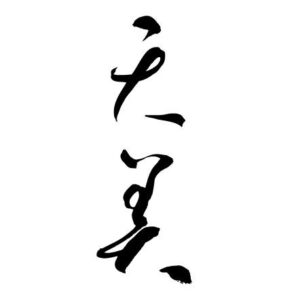
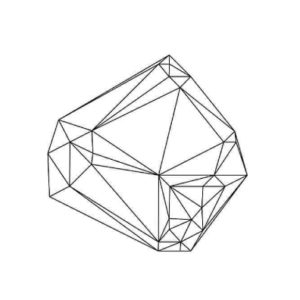
Original and simple, yet impressive. Once seen, the typeface and symbol are hard to forget.
The kanji character of “天“ originally meant the highest head of a person, but it came to mean the sky, and heaven was thought to be the place where God resided and thus came to mean a sacred place (as precious as a god). (Ref. site: Japan Knowledge: japankowledge.com)
“Sky" and "beauty”: my first impression was that the word TENBI represented a constellation of stars, but I was wrong.
This symbol represents the most active and most beautiful moment of fermentation during the sake brewing process.
Ms. Fujioka, brewmaster, selected the most beautiful shape she thought was "the one" from more than 700 patterns of the image of fermentation, and it was fine-tuned by a designer. Isn’t it romantic to sip sake while thinking about the fermentation process of sake making?
The typeface is delicate yet dynamic.
The typeface was written by a calligrapher who is good at kana characters. By daring to write in kanji characters, the challenge represents the transition from Kodama Brewery to Choshu Brewery.
About Labels
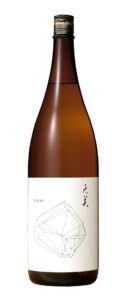
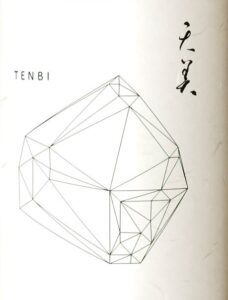
First is the basic white symbol on a white base: Junmai Ginjo (White 白天).
Whiteness represents a “just born” brewery, implying the importance of starting from scratch.
Not only for fresh food but it is also recommended as an aperitif.
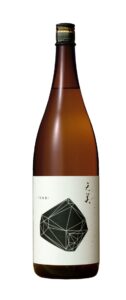
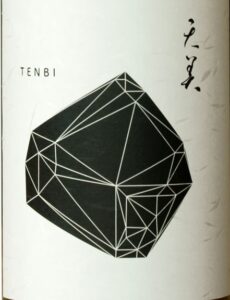
Special Junmai (Black 黒天) has a slightly sour taste and is made as a sake to take during meals and goes well with any dish.
The label should be easily recognizable" says Ms. Fujioka. That is why TENBI labels are all so simple, yet memorable.
The lineup continues.
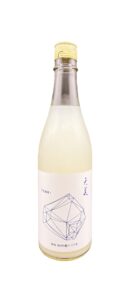
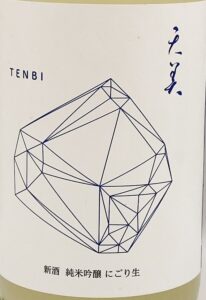
This Junmai Ginjo (Snow 雪天) has a silky mouthfeel with light and well-balanced sweetness and acidity. It is a winter-only product.
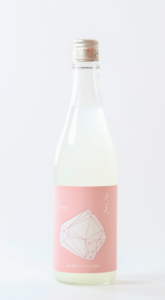
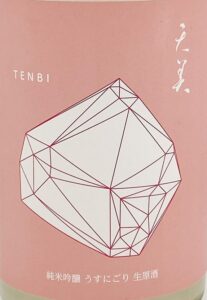
A spring-only product, Junmai Ginjo (Pink 桃天) is a slightly cloudy and unpasteurized sake. It is the most popular product of the brewery.
Incidentally, the nicknames "White: SHIROTEN," "Black: KUROTEN," "Snow: YUKITEN," and "Pink: MOMOTEN" were given by TENBI fans before Ms. Fujioka knew about them. It is evident how much they are loved by the customers.
Recently, a Junmai Daiginjo series using sake rice representative of the four Setouchi prefectures has been released.
Starting with Akaiwa Omachi in May, followed by Hiroshima Senbon Nishiki in June, Banshu Aiyama in July, and Choshu Yamadanishiki in August.
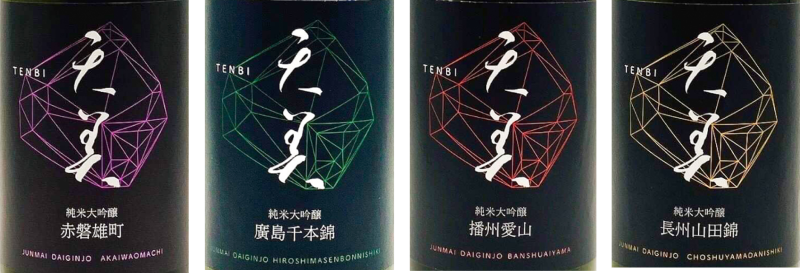
It is said that the difference between rice in sake is distinctive when changing the yeast, but this series was Ms. Fujioka's challenge to create a unique TENBI by using different rice but under the same rice polishing rate and the same yeast. The key was fermentation management. Ms. Fujioka says, "You can enjoy the different flavors of each rice.
About Choshu Sake Brewery
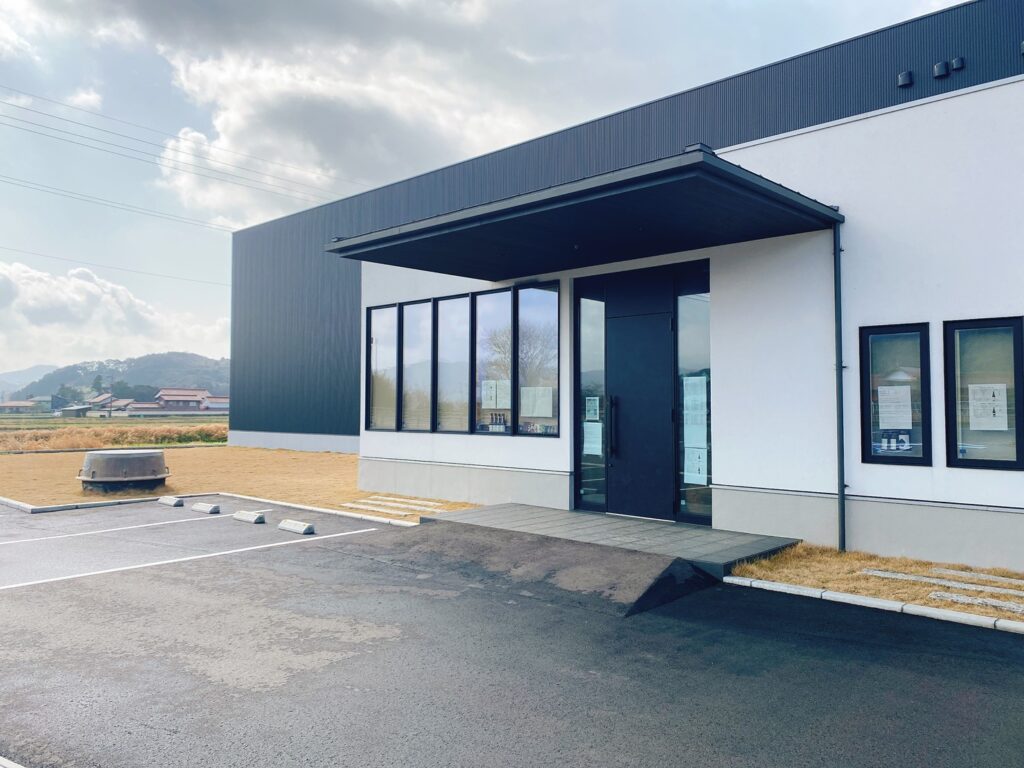
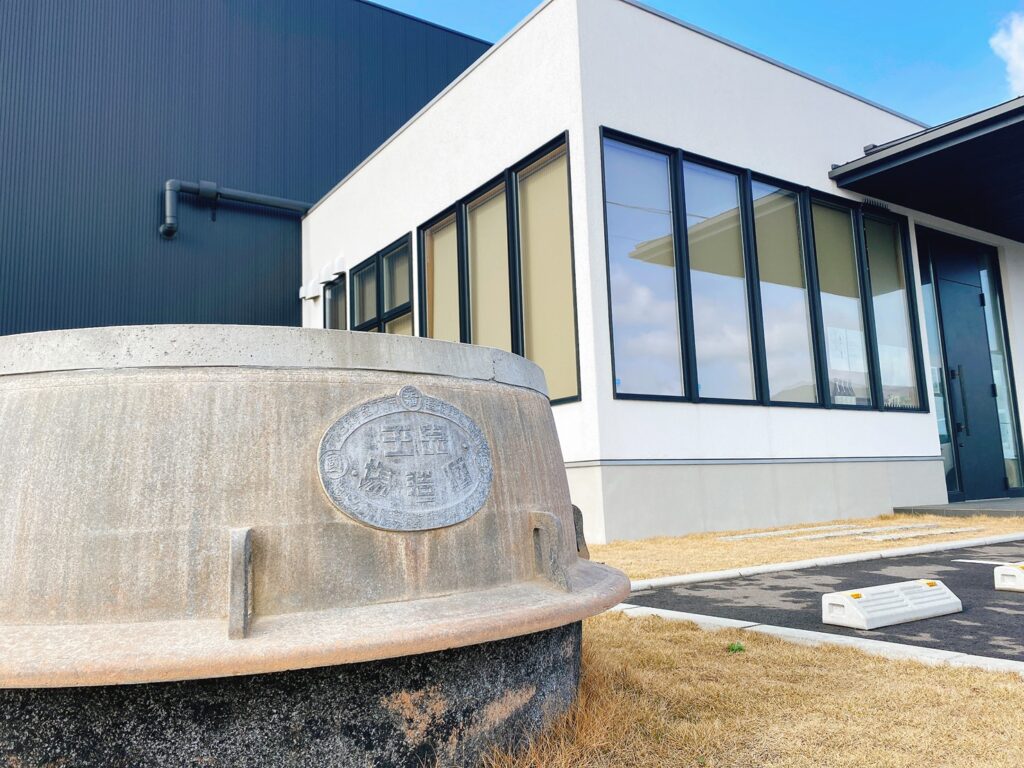
Worthy of note is the toji, Ms. Fujioka. She is one of only about 50 female toji (master brewers) out of the 1,500 breweries in Japan (as of 2022).
Her family had nothing to do with sake-making. Even so, she has loved baking bread since she was a child. Ms. Fujioka says she especially enjoyed watching the leaven ferment and swell. Who would have imagined that this would lead to making sake, another type of fermented food?
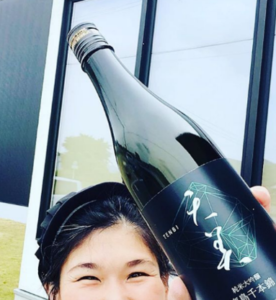
Her love of fermentation led her to major in that field at university. She says that her love of sake was awakened in an environment where she was surrounded by people related to sake brewing families.
Yet, Ms. Fujioka had never thought sake tasted good before. One day, however, she visited a sake brewery and drank a glass of freshly extracted sake. And that was the moment her image towards sake completely changed. She then entered the world of sake brewing out of a desire to share this delicious product with others.
After more than 20 years of training, she was headhunted as a toji at Choshu Sake Brewery in 2020. It was just the time when Choshu Sangyo reconstructed the Kodama brewery. She started with only four people in the beginning, but her name quickly became well known throughout Japan (11 people including temporary staff as of July 2022). Now, she is the center of attention as she was featured as the "supernova of Choshu" in the trendy magazine, “danchu” issued in March 2022.
Mr. Susumu Okamoto of Chosyu Sangyo doubles as president, and Ms. Fujioka is the sake brewer. However, she is in charge of almost all aspects of the Chosyu Brewery, from upper management to the smallest of details, and is active on all fronts.
Regarding the future of TENBI, Ms. Fujioka says, "Now, I have come to see a future direction. We will concentrate on further quality improvement and stability. Also, we have to train staff and would like to contribute to the local community...". She herself seemed to be still "fermenting”.
TENBI is rather easy to drink for those who are not familiar with sake or those who think it is a bit difficult to drink. That is why we would like such people to pick it up and try it at least once.
Interview Date: July 17, 2022 (ZOOM)
Interviewee: Ms. Miki Fujioka, Toji of Choshu Sake Brewery, Co., Ltd.
Image Data Presented by: Choshu Sake Brewery
Interview Note: It was the long-awaited interview for which I finally got an appointment with the superhumanly busy Ms. Fujioka. The female toji, who has been featured in many media, was so charming that I was drawn in by her smile before she even began talking.
The world of sake brewing is hard labor even for men. So, my question was “was there any female-specific hardship stories? or conversely, were there any things that only a woman could do?” She replied pleasantly, "It is true that making sake is hard work. But we all face the sake together. Women may be more considerate. Men are stronger than women, but there is not much difference. You just do what you're good at. It's just a matter of being prepared. Or it's a matter of attitude."
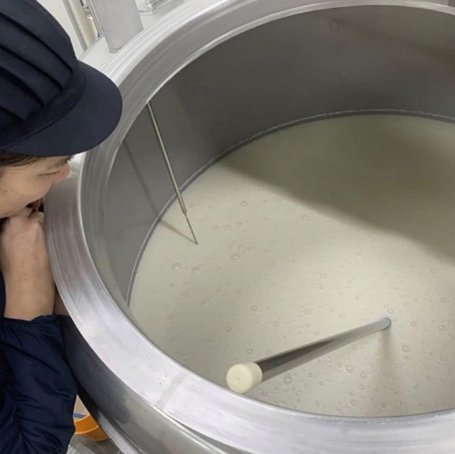
(From Choshu Sake Brewery’s Official Instagram)
Ms. Fujioka says she has always enjoyed watching leaven expand. Now, that has turned into moromi (mash), and she says, "The pops of the moromi are so beautiful. I can watch it forever.”
I never doubt that sake brewed by a toji who can express herself in such a cute way would turn out to be wonderful!

